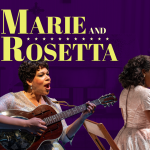“Othello” gives Iago his due

Aftermath of a gunfight early in the Rep’s “Othello.” All photos by Michael Brosilow for the Milwaukee Repertory Theater.
In fictions, the devil tends to be more entertaining than the good guy.
In Iago’s many soliloquies, Neugent addresses the audience frankly. He makes us his confidante, and we come to feel complicit in his crimes. Our role carries a certain frisson. Do not even the most civilized among us thrill at the idea of chucking it all and being bad? Isn’t the entire marketing image of Las Vegas built on that impulse?

Gerard Neugent as Iago and Reese Madigan as Michael Cassio. Milwaukee Rep photo by Michael Brosilow.
This complicated take on Iago is one of many pleasures in Mark Clement’s staging of the classic tragedy. Clements went for earthy immediacy, partly achieved by bumping the action from 16th-century Venice and Cyprus to motorcycle gang culture in generic rust-belt America. Todd Edward Ivins decked the cast out in leathers and the stage in decaying girders and steel walls. They move with the massive precision of 19th-century swing bridges. These scary people inhabit a space of ironclad gloom, heightened by Jeff Nellis’ moody lighting. Motorcycles — Harleys, of course — roar in at intervals. To get the players from Venice to Cyprus, for example.
The concept makes a lot of sense, first for undercutting the notion that these long-ago fiefdoms were anything like modern nation states. Rival families and coalitions of them fought for dominance; they were more like mafias than governments. Taking away the fancy robes and high manners drives that home.
The rough shoes, leathers and grimy denim alone carry some swaggering weight, and the large cast wears them well. Everyone wants to look big and menacing; it’s a status thing in this culture. The Rep’s actors were convincing in this, starting with big, muscular Lindsay Smiling in the title role. Shakespeare’s words have never sounded so black as on Smiling’s lips, and that helps to throw the racial lines that really figure in the play into uncommonly sharp relief. Othello is a prince on merit and against the odds, and he strides like one among his minions. The change in his body language, as Iago’s carefully planted seeds of jealousy begin to poison Othello, is among the most affecting aspects of the tragedy.
But Othello, like his minions, is a killer. You can’t shed too many tears for him. Or for Jonathan Wainwright’s Roderigo, Iago’s nervous, expendable puppet. Or for Reese Madigan’s Michael Cassio, whose honor extends only to his colors.
Shakespeare and Clements direct our sympathy to the women, Deborah Staples’ Emilia and Mattie Hawkinson’s Desdemona. They have entered this world excited by their violent men but get more than they bargained for. Emilia is Iago’s wife, a tough, veteran biker babe who thinks she knows the rules. Othello’s tales of valor swept the innocent and clueless Desdemona off her feet. Her love has changed the gang leader, but she is at sea in this world of sharks. Emilia takes her under her wing.
Staples and Hawkinson played the most beautiful duet late in the play, a little before Othello kills Desdemona. They talk about their men and their place in relation to them, and what they have and would sacrifice for them. The pace and tone were so thoughtful, their interaction so natural. This scene builds sympathy for them and shows Shakespeare’s remarkable awareness of a plausible female point of view. The scene, quiet as it is, is one of the most important in the play. It gives their lives and deaths more meaning.
That intimate moment serves as the eye of a hurricane of a play. It’s rowdy and noisy, blasting with metal music and roaring motors, loaded with fighting and sex. Tragedy aside, this staging offers lots of theatrical fun.
The great things in this show make tempting to overlook the two flaws. But here they are. The costumes are great, generally, but I’m begging, here: Don’t make the Duke of Venice, aka James Pickering, wear that ridiculous feathery fur collar and those pink glasses. Remember when they booked Elton John for the Harley 100th birthday at the lakefront? Didn’t go so well.
More seriously, we have to wonder how this delicate flower, Desdemona, bloomed in the stony ground of Brabantio’s household. Lee E. Ernst plays him as the baddest of bad asses, and he dresses the part. How does she come out of his home so naive about biker-gang life? Shakespeare made Brabantio a tough guy given to violent language, but maybe it would make more sense to take him out of The Life, to make him a prominent father trying to keep his daughter away from the gangs infesting Venice. For her character’s innocence to be plausible, she must somehow be sequestered prior to her involvement with Othello.
Brabantio would have reason beyond the color of Othello’s skin to be hopping mad. His baby would be getting involved with the wrong crowd. And any father would tell you, that’s real tragedy.
Cast and Credits: Brabantio/Montano, Lee E. Ernst; Bianca/Ensemble, Melissa Graves; Desdemona, Mattie Hawkinson; Lodovico, Michael M. Kroeker; Michael Cassio, Reese Madigan; Iago, Gerard Neugent; Herald, Alexander Pawlowski IV; Duke of Venice, James Pickering; Othello, Lindsay Smiling; Emilia, Deborah Staples; Roderigo, Jonathan Wainwright. Creative Team: Playwright: William Shakespeare; Director: Mark Clements; Set & Costume Design: Todd Edward Ivins; Lighting Design: Jeff Nellis; Original Music/Sound Design Barry G. Funderburg; Text/Vocal Coach Gale Childs Daly.
Show and Ticket Info: Othello runs through May 6 at the Powerhouse Theater, with shows at 7:30 p.m. weeknights, 8 p.m. Fridays, 4 and 8 p.m. Saturdays and 2 and 7 p.m. Sundays. Tickets range from $10 to $65, at the Rep’s website or box office, (414) 229-9490.
Get more out of TCD. Check out our User Guide/FAQ.
Theater
-
‘The Treasurer’ a Darkly Funny Family Play
 Apr 29th, 2024 by Dominique Paul Noth
Apr 29th, 2024 by Dominique Paul Noth
-
Rep’s Nina Simone Play a Puzzle
 Apr 23rd, 2024 by Dominique Paul Noth
Apr 23rd, 2024 by Dominique Paul Noth
-
Skylight’s ‘Eternity’ Is a Slam Bang Show
 Apr 15th, 2024 by Dominique Paul Noth
Apr 15th, 2024 by Dominique Paul Noth






















My wife and I attended this show last night. Although we weren’t quite sure what to expect, the use of ‘biker gangs’ and the whole culture lent itself well to Shakespeare’s Othello. Gerard Nugent really does well as the despicable Iago, bent on revenge. Well done!
(Just one thing if you go, attend the ‘Rep in Depth’ 45 minutes prior to the show as the origins of biker gangs and their hierarchy is discussed – very interesting and helps in understanding some of the characters roles.)
You obviously don’t know much about biker life. Bikers can be very protective of their offspring and often times keep their family life very seperate from their gang life. The Italian Mobsters were the masters of that trait, and the bikers followed suit. Desdemona’s innocence and naivete is absolutely plausible.
“Shakespeare’s words have never sounded so black as on Smiling’s lips” Still trying to figure out if this is a complement or a slam. I think the entire cast was wonderful and the interpretation was delightful. Smiling and Hawkinson put a spark in the romantic aspect of the plot that even Shakespeare could not envision. This was truly magical to see and I personally recommend unabashedly.
To be honest, I’m not sure about the biker setting. For me, it didn’t really help the play. But by the same token, it didn’t detract from it either. The strength of this production is in the play itself– the language, and the pacing, which is especially quick in the second half.
A couple of positive comments. First, showing the marriage of Othello and Desdemona in pantomime, before the play begins, was very shrewd. It visually establishes the marriage for the audience. This is not mentioned in the text of the play. Second, Gerard Nugent’s playing of Iago is fabulous.